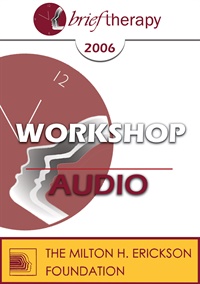BT06 Workshop 39 - Children, Families and Trauma: A Relational Approach - Kenneth V. Hardy, PhD
- Average Rating:
- Not yet rated
- Topic Areas:
- Workshops | Children and Adolescent Therapy | Family Therapy | Trauma | Brief Therapy
- Categories:
- Brief Therapy Conference | Brief Therapy Conference 2006
- Faculty:
- Kenneth Hardy, PhD
- Duration:
- 2:04:30
- Format:
- Audio Only
- Original Program Date:
- Dec 10, 2006
- License:
- Never Expires.
Description
Description:
Ignoring the impact of trauma on the client's family overlooks powerful dynamics that are crucial to treatment outcome. Participants in this workshop will learn how to involve the trauma sufferer's partner and other family members as resources in the healing process. Participants will learn how to better educate clients about the typical symptoms of trauma, the stages of trauma recovery, how to help family members both soothe and set limits with the traumatized person, and the typical pitfalls families encounter - including the depleting response of "enough already" as a family member tries to heal from a trauma.
Educational Objectives:
- To describe a conceptual framework for providing a Relational Approach to trauma.
- To describe three strategies for treating the hidden wounds of trauma.
*Sessions may be edited for content and to preserve confidentiality*
Credits
Faculty

Kenneth Hardy, PhD Related Seminars and Products
KENNETH HARDY, PhD, is Professor of Family Therapy at Drexel University in Philadelphia, Pennsylvania, and Director of the Eikenberg Institute for Relationships in New York City, where he maintains a private practice specializing in working with children, families and trauma. Dr. Hardy's work has been featured on the Oprah Winfrey Show, ABC's 20/20, Dateline NBC and PBS. He is a frequent presenter at conferences devoted to understanding the needs of traumatized youth and their families. He has published extensively in the field and is the co-author of Teens Who Hurt: Clinical Interventions for Breaking the Cycle of Youth Violence, and Minorities and Family Therapy.


